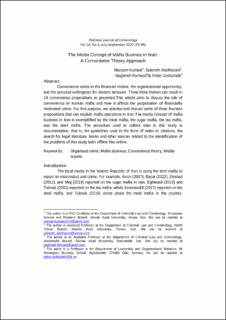The media concept of mafia business in Iran: A convenience theory approach
| dc.contributor.author | Kamaei, Maryam | |
| dc.contributor.author | Abolhasani, Salameh | |
| dc.contributor.author | Farhood, Naghmeh | |
| dc.contributor.author | Gottschalk, Petter | |
| dc.date.accessioned | 2024-02-01T14:53:43Z | |
| dc.date.available | 2024-02-01T14:53:43Z | |
| dc.date.created | 2023-03-02T17:50:05Z | |
| dc.date.issued | 2023 | |
| dc.identifier.citation | Pakistan Journal of Criminology. 2023, 14 (3), 79-99. | en_US |
| dc.identifier.issn | 2074-2738 | |
| dc.identifier.uri | https://hdl.handle.net/11250/3115125 | |
| dc.description.abstract | Convenience exists in the financial motive, the organizational opportunity, and the personal willingness for deviant behavior. These three themes can result in 14 convenience propositions as presented.This article aims to discuss the role of convenience in Iranian mafia and how it affects the perpetration of financially motivated crime. For this purpose, we selected and discuss some of these fourteen propositions that can explain mafia operations in Iran.The media concept of mafia business in Iran is exemplified by the meat mafia, the sugar mafia, the tea mafia, and the steel mafia. The procedure used to collect data in this study is documentation, that is, the guidelines used in the form of notes or citations, the search for legal literature, books and other sources related to the identification of the problems of this study both offline like online. | en_US |
| dc.language.iso | eng | en_US |
| dc.title | The media concept of mafia business in Iran: A convenience theory approach | en_US |
| dc.title.alternative | The media concept of mafia business in Iran: A convenience theory approach | en_US |
| dc.type | Journal article | en_US |
| dc.type | Peer reviewed | en_US |
| dc.description.version | publishedVersion | en_US |
| dc.source.pagenumber | 79-99 | en_US |
| dc.source.volume | 14 | en_US |
| dc.source.journal | Pakistan Journal of Criminology | en_US |
| dc.source.issue | 3 | en_US |
| dc.identifier.cristin | 2130874 | |
| cristin.ispublished | true | |
| cristin.fulltext | postprint | |
| cristin.qualitycode | 1 |
